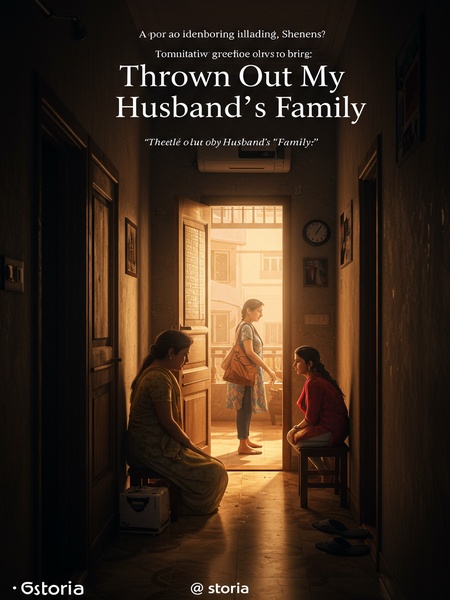Chapter 1: The Divorce Demand
My dad is the golden boy of Mumbai’s high society—everyone from Malabar Hill to Bandra knows his name. My mom? She’s the daughter of a machhiwala from Kaveripur. Not a single soul in Mumbai thought their marriage would last. When I was seven, Dad got into a car accident and lost his memory. After he woke up, he made a big scene about wanting a divorce. He sneered, "Kya soch tha mujhe, marrying a machhiwali’s daughter? I must’ve lost my senses." He wrinkled his nose, as if the memory itself stank of yesterday’s catch.
In the hallowed living room of our old South Mumbai bungalow, the ancestral portraits on the wall seemed to watch, their oil-painted eyes glinting with silent judgment. The air was thick with sandalwood and the smell of fresh rain, while the impatient honk of an auto drifted in from the street. The Mehra family, decked out in crisp cottons and pearl necklaces, barely hid their glee. Even the neighbours peeking from behind lace curtains didn’t believe our family could survive the glare of Mumbai society. Dad’s words echoed on the marble floors, sharper than the mandir bell’s chime.
The Mehra family was secretly overjoyed. They quickly summoned his so-called ‘white moonlight’—the woman Dad always secretly loved—to take her place. The hospital room door swung open, and in strode a woman in fluorescent pink rain boots and a floral rubber apron. Dad sucked in a sharp breath. He muttered in a low, hard voice, "White moonlight, your tricks are impressive indeed."
The anticipation in the room was thick, like the Mumbai air before a monsoon. Everyone leaned forward, gold bangles clinking, as the only sounds were the ceiling fan’s whirr and the distant TV from the nurse’s station. But the woman who entered wasn’t the glamorous Priya everyone imagined. Dad’s face, usually stoic, twisted in disbelief as the unmistakable scent of fish followed her in.
But it was only my mom, straight from the fish market, apron still wet.
Her hands glimmered faintly with silver scales; her hair was pulled back in a loose plait, a red glass bindi slightly askew. The rubber apron was dotted with water stains, but her eyes burned with the pride of someone who wakes before dawn to earn a living. No one could look more out of place among the hospital whites—yet Amma stood there, quietly dignified.
My mom is mute. After she entered, she and Dad stared at each other in silence. I stood by Dad’s bedside, listening to his even voice: "White moonlight, your tricks are impressive indeed."
The tension was so thick it was like someone forgot to turn off the pressure cooker. Mom’s eyes darted between Dad and the others, chin up, refusing to look away. I clung to the edge of her kurta, feeling tiny among so many judging stares.
The Mehra family crowded in, not really hearing Dad’s words, and started chattering among themselves.
Aunty Rupa’s gold earrings shook with indignation. "Rohan, did you see? You even dared to marry a woman who reeks of fish." Uncle Manjeet grumbled about family izzat, while Dadi adjusted her pallu, lips pursed, while the aunties exchanged glances over their rimless glasses. "Her mother was into all those black magic things—buri nazar, lemon and chillies and all."
"Priya is an Oxford graduate, she’s waited for you all these years. Finally, God has opened his eyes…"
Their voices overlapped, a chorus of crows outside the temple. Someone clicked their tongue in pity. Another shot Amma a glare that would have curdled fresh dahi.
Second Dadaji stepped forward, demanding Dad make his position clear. "The Mehra Group’s legal department already drafted the agreement. Sign it now."
He waved a thick envelope, the kind smelling faintly of stamp paper and camphor. Even the servants in the hallway paused, eager to witness the spectacle.
Through the glass, I saw Dad’s ‘white moonlight’ outside the door. Her lips curled in a smug smile, her demeanor elegant. Unlike Amma, who was summoned at the last minute, apron still dotted with scales. Judging by the past few days, she already knew what was coming.
She sniffed and took the agreement. Dad pressed down on it, voice icy. "Wait, the one I married is you?" There was a strange loneliness in his eyes. Both gripped a corner of the paper, knuckles straining. I knew it—Dad was always good to us. What did amnesia prove?
But the next second, he scowled, pointing at the property clause. "Five lakh?" His gaze dropped to Amma with contempt. "I’ve been disgusted for so long, and you still want to take both food and money?" He signaled to Secretary Singh. "Redraft the agreement. Just use the going rate for a maid—pay her for the work she’s done, nothing more."
The words landed like a slap, echoing in the sterile hospital room. Mom’s hand trembled ever so slightly in mine. Secretary Singh, always poker-faced, gave a curt nod and hurried out. The murmurs grew louder, thunder rolling in before the storm.
The Mehra relatives sighed in relief. I tugged Amma’s sleeve, meeting Priya’s gaze outside. Her lips moved silently, taunting, "Chalo, kachra rani, back to your galli."
She smirked, head tilted arrogantly, manicured fingers drumming on her Birkin. I clenched my fists, ready to shout back, but Amma squeezed my shoulder—a silent reminder to hold my head high. A nurse walked by with a tray of cutting chai, and for a moment, the world was both heartbreakingly ordinary and unbearably cruel.
We stepped into the storm, heads held high—even if no one inside cared if we drowned.
Continue the story in our mobile app.
Seamless progress sync · Free reading · Offline chapters